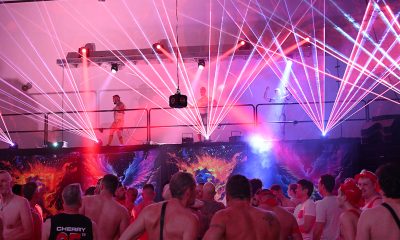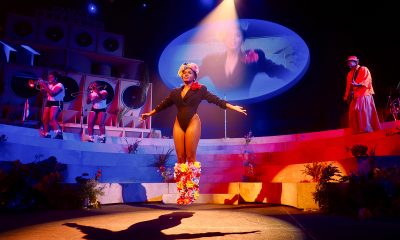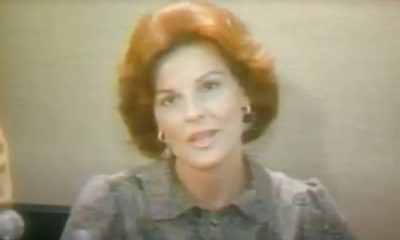a&e features
Trinity’s tricks of the trade
‘Drag Race’ finalist gears up for ‘War on the Catwalk’ tour
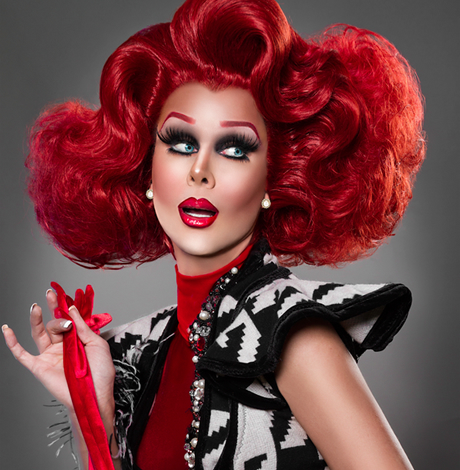
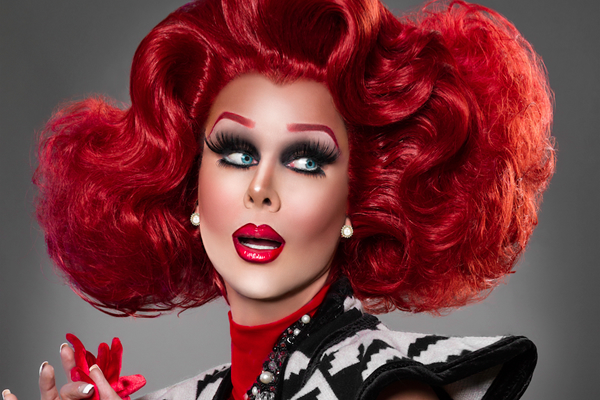
Trinity Taylor (aka Ryan Taylor) says her season was one of the tightest competitions in the history of ‘RuPaul’s Drag Race.’ (Photo courtesy VH1)
Trinity Taylor, one of the finalists from season nine of “RuPaul’s Drag Race,” is on the “War on the Catwalk” tour, which was slated to kick off Thursday in New Haven, Conn. (tickets, dates, etc. here)
The queens come to Washington Sunday night, July 16, at the Warner Theatre. Trinity spoke with the Blade by phone Tuesday from her home in Orlando, Fla.
WASHINGTON BLADE: Where are you right now?
TRINITY TAYLOR: I’m in my bedroom. Are you gonna ask me what I’m wearing next?
BLADE: Sure, why not?
TRINITY: A grungy T-shirt and we’re leaving it there (laughs).
BLADE: Tell us about the tour.
TRINITY: Yeah, well, I was very fortunate that they asked me to host the tour which is kind of nerve wracking because I’ve hosted tons and tons and tons of shows but this is a major tour this season nine tour, so there’s a lot more pressure. So hopefully I do OK. I am, you know, I’ll do what I do best — show my tuck, hopefully make some people laugh and the biggest thing is just entertain because that’s what I am, an entertainer.
BLADE: I thought Trixie was hosting.
TRINITY: We’re both hosting. Maybe certain dates. I don’t know that she’s doing the whole thing.
BLADE: How did you like the format for the “Drag Race” finale this year?
TRINITY: Well obviously I thought it was terrible because I didn’t make the top two (laughs). I’m just kidding. I think it was great for the show. It’s something the show needed because the show was very predictable the past couple of years, you know, the person who wins the most challenges wins. So this was definitely something that was shocking and something different which is good, change is good. I think it got a lot of attention and exposure and that’s good for the show and whatever’s good for the show’s gonna be good for me.
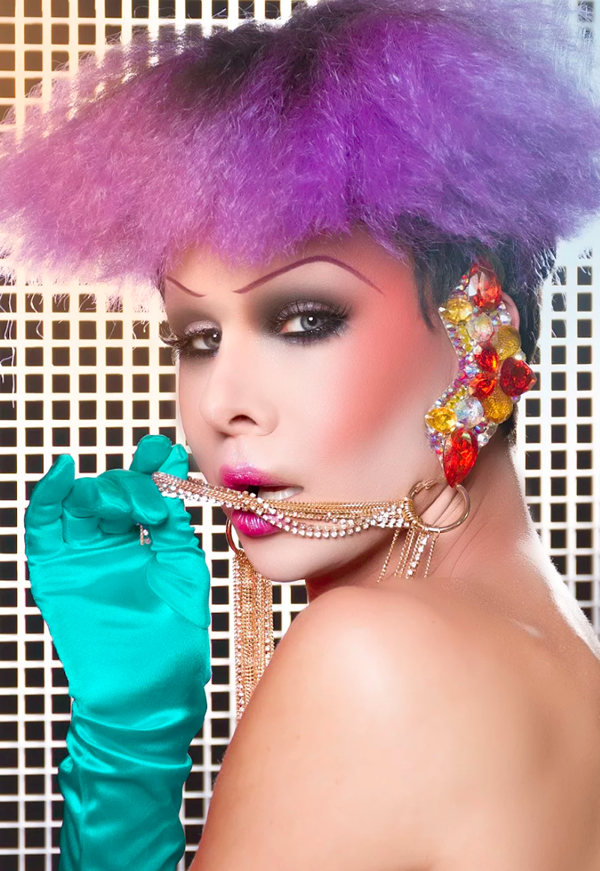
Trinity Taylor (Photo courtesy VH1)
BLADE: Charlie Hides said during the reunion she only got two hours of sleep one night. Is the competition really that intense? Did you sleep well during the run?
TRINITY: So, um, Charlie, I love Charlie, but the reason why Charlie was saying all these excuses was people were putting her on the spot for her terrible lip sync. So she was just grasping at straws. As far as sleep goes, first of all, this is a competition. You’re not signing up to go to a weekend spa. When they say it is “RuPaul’s Drag Race,” it is really a race. You have very little time, the schedule is grueling, the challenges are not easy. … If you’re watching it and you go, “Yeah, I could do that,” well yeah, you maybe could do that if you had the time but when you’re on a time crunch, you don’t have a lot of time and so, you might not do your best. Or you may do phenomenal, but it is a race. So as far as sleep goes, you got plenty of hours to sleep because there was a schedule of when we were done and when we were picked up. But when you had your alone time in the hotel rooms, you did have to make sure you knew your lip sync songs, make sure if you had anything last minute you needed to work on, prepare for, you know, all that’s on your own time. So for her to say she didn’t have enough sleep, that’s really on her.
BLADE: Could you tell she was phoning it in on that lip sync or were you too busy concentrating on your own performance to realize that?
TRINITY: Until I watched it on the episode, I didn’t know what she did. I kind of just zoned out, I was just like, “I’m in the bottom, I’ve got to stay,” and it didn’t matter who I was lip syncing against, I was going to stay, that was my focus. So she wasn’t even there to me, I was just performing.
BLADE: What struck you most watching the show vs. experiencing it in person? Do you see it at all before it airs or you see it with everybody else?
TRINITY: Oh, no that’s the first time we see it. What’s shocking is — I’ll give Alexis as an example. On the show, Alexis didn’t — I liked Alexis, she was not annoying at all, I didn’t see this like person who made excuses and blamed us for not doing well. For some reason it didn’t click in my mind while I was there that she was complaining a lot like that. And then watching the episodes I’m like, “Dang, she really tried to come in for us.” And so seeing it from a different perspective from actually being there, it just registers differently. And also seeing how everything is edited together. Not that they edited stuff that was not true, but just seeing how it all tells a story, it’s very interesting.
BLADE: On “Untucked” there’s often notes for the girls who are leaving in the workroom but it looks like they’re taken in there as soon as they get their makeup off. When do you have time to write notes if you’re — it appears — still out there on the main stage?
TRINITY: Um, what happens, um — I don’t know if I’m allowed to tell you this but I’m gonna tell you anyway — what happens is after they have the person sashay away, that person goes and is sequestered for a short period of time, not long. For us to film the rest of it when she says, “If you can’t love yourself …” and then they play music and we leave. When we leave, we go directly back to the work area, take off our makeup and that’s when we are allowed to do the notes. Then we leave and then the person who’s eliminated is allowed to come back and that’s when they actually pack to leave. But the reason why we get our makeup off is they still have filming to do and they want to get us out of there quickly because we have to be up the next morning.
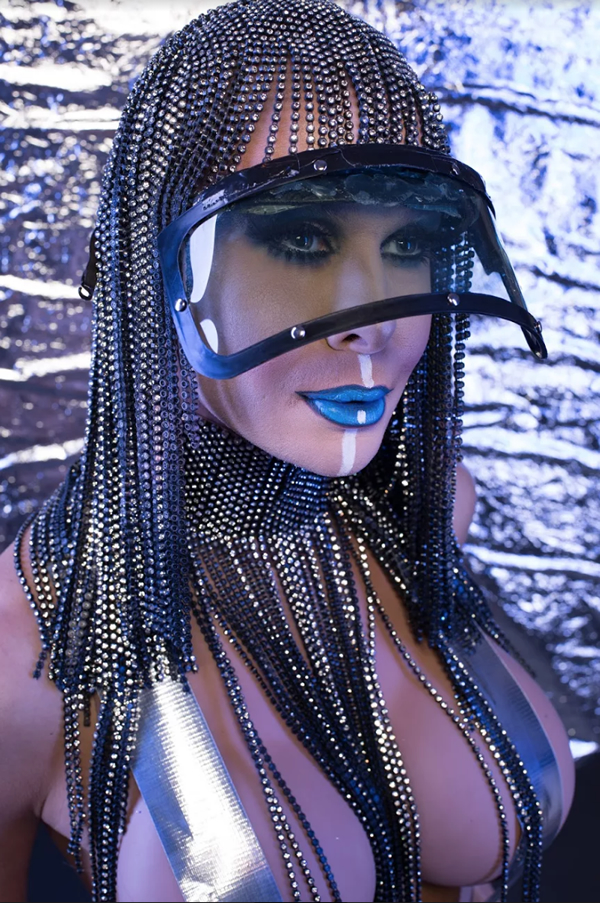
Trinity Taylor (Photo courtesy VH1)
BLADE: Your boyfriend was so hot in the finale. I was jealous. Are you still together and how are things going?
TRINITY: Um, we broke up that night actually. No, just kidding, we’re still together. He’s still a doll and I am very blest to have him in my life. He’s very supportive.
BLADE: Remind me his name.
TRINITY: His name is Leo. He’s just a great guy.
BLADE: Have fun with that.
TRINITY: Oh trust me, I do.
BLADE: I was enthralled by Valentina at first but later, especially at the reunion, she struck me as really fake nice and she got a lot of flak from the other queens. What’s your take on her?
TRINITY: Well I love Valentina. Me and her are probably the closest from this season out of all the girls. On the show, I hated her. I thought she was a diva. She got a really great edit. There were several girls who got really great edits. Like the producers for some reason just didn’t see what we all see, but like Valentina was a diva brat on the show, she was. Kind of like what you saw in the reunion. Valentina in person though, as you get to know her, she really is a diva. But like it’s just different. Getting to know her and interacting with her in person in everyday life vs. on the show is different. She’s a diva and she has this grandiose aura about her all the time, even as a boy. It’s not fake but I can see how it could come across fake because it came across fake to me on the show but that’s just how she is.
BLADE: On the makeover episode with the crew it showed you back there helping your partner with his tuck. Were you actually taping his dick back or just handing him the tape and telling him what to do? That must have been awkward doing that with a straight guy.
TRINITY: His name is Rizzo. It was not awkward at all for me. Obviously he was, you know, a beautiful man. First of all, he didn’t want to be taped but he knew that was part of my schtick as an entertainer is my tuck and if he’s gonna be my partner, he’s gotta have a fierce tuck too. I told him you’re gonna have to shave everything because if you don’t, you’re gonna hate yourself. So he shaved everything except his ass, he shaved everything in the front. We couldn’t tape him like my tape which is tape to skin, so we put a pair of tiny, tiny, tiny underwear on him and we taped over the underwear because you can’t have tape on hair. That would be a nightmare. I didn’t have my hands on his penis but I was back there to like really, really help him. After he got the tape on, I had some hands on helping him but, you know, I tried to keep it professional as much as I possibly could, taping on top.
BLADE: Who was your favorite celebrity judge?
TRINITY: Oh absolutely Lady Gaga. She just was very genuine. I felt like she was genuinely interested in what we were doing and what we had to say and in “Untucked” she actually came back there and did a one-on-one critique with us and told us bluntly what she thought and I believed everything she said. She’s very wise about her experience in the industry and the advice she gave us was, she just was very genuine and heartfelt. I liked her. A couple of the judges were just there because they were asked to be there but she was actually excited to be there.
BLADE: Is Cheyenne Jackson as hot in person as he looks on TV?
TRINITY: Oh girl, he is a Daddy. I would sit on his face. He is, yes, he is beautiful. And he’s got like this swag about him, like, I don’t know, this smooth, cool guy attitude. And he’s hot, yes.
BLADE: The reunion seemed especially bitchy this year. Why?
TRINITY: By then, we’d seen the show and we got to see what everybody truly said, some of which we hadn’t known before. That’s why a lot of the girls were not as friendly like they were on the show because they got to see the true side of people and they wanted to voice their opinion.
BLADE: How are you and Eureka now? Think you’ll get along OK on the tour or have you spoken to her lately?
TRINITY: I hate her. I think she’s a terrible human being. (laughs) She’s actually a cool girl. I have no qualms with her at all. We’ve actually talked since the show. The thing with Eureka is, I didn’t have any beef with her. I beat her (in a previous pageant). Why would I have a beef with somebody I beat? To me, she was holding onto a grudge because I had beaten her. That’s where the beef came in because she had something against me. As far as like since the show, we have some similar personality traits but also some real differences and I don’t feel like our personalities mesh well for long periods of time like being on a show together for many, many days, that’s where you get a lot of conflict. But I like Eureka. I think she’s very talented, I think she has a lot to offer and I think she’s going to slay season 10. She’s very funny, so I feel like we’re in a good place.
BLADE: What’s the Ruvealed going to be that starts June 29th? Is that just outtakes or do you know?
TRINITY: I think it’s just you get to see clips that weren’t put in the show because of time. Like an extended version of the show. More outtakes, more things you haven’t seen yet, stuff like that.
BLADE: Some years it seemed there was a clear frontrunner like Bianca or Violet. This year it felt to me like you could have made a good case for any of the top four. I know it’s hard to say when you’re in the middle of it, but do you agree?
TRINITY: No, this was to me, and I’m not trying to be biased, I’m a fan of “RuPaul’s Drag Race” even though I’ve been on the show. I watched all the season past as a fan and this season, the cast was probably collectively the strongest cast they’ve ever had, as far all the girls brought it. All the girls have fashion, all the girls brought it in the challenges, so they are a very talented group of girls so that’s why there wasn’t a clear standout winner like when Bianca won or when Bob won or Violet won. There was just more competition. Like you said, there was a valid case for each of the girls in the top four of why they could have won and that makes for better TV, that makes for better competition. I hope that every year from now on, they do that good a job of casting where they actually pick top-notch girls from start to finish. That way, you don’t know who’s going home.
BLADE: The “Drag Race” wiki said at one point you considered transitioning to further your career. Is that true and do you think, like this was something some fans said about Peppermint, is transitioning — not that it’s bad or wrong by any means — but at some point does that become a different thing from the art of female illusion?
TRINITY: OK, so to answer your question, yes that is true. To answer the last part of the question first, being a trans person whether you’re a trans woman or a trans man, that is completely different from being a drag queen, drag king or an entertainer. I have really good friends who never entertained or don’t entertain anymore who are trans. Being trans is who you are on the inside. Being an entertainer or being a drag queen is a hobby or your job or your creative outlet. You can be both, like Peppermint, but being trans is completely different. Now years ago when I was first starting pageants, I contemplated transitioning not because I felt I was trans, but because I felt the pressure from pageants because a lot of really well-known, successful pageant entertainers are trans and I felt that was the route I was gonna have to take if I wanted to be successful. I’m glad I didn’t go down that route because I am not trans and you should never transition for the wrong reasons. You should transition because that is who you are and that’s how you feel on the inside, not because of pressure from a job or wanting to further your career.
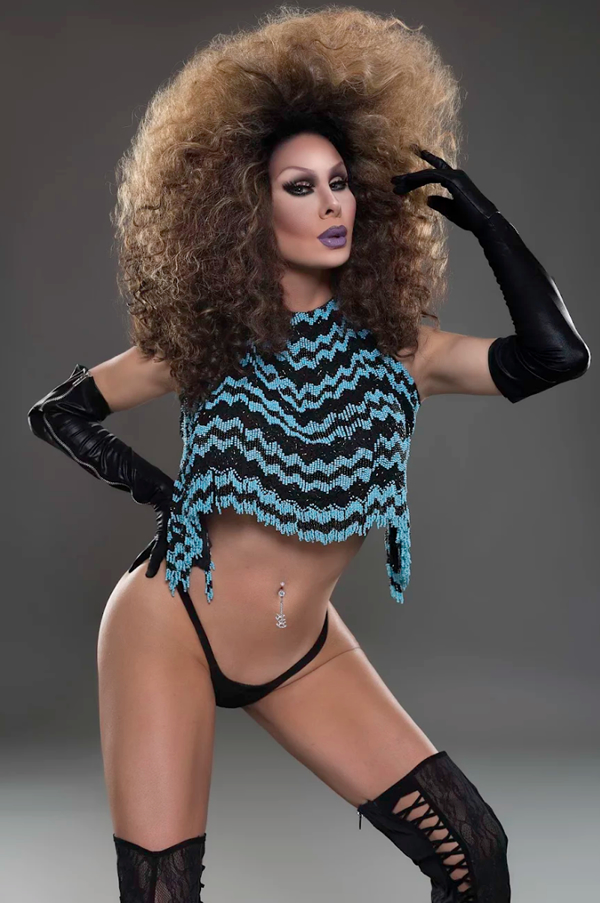
Trinity Taylor (Photo courtesy VH1)
a&e features
Tristan Schukraft on keeping queer spaces thriving
New owner of LA’s Abbey expands holdings to Fire Island, Mexico

LOS ANGELES — Like the chatter about Willy Wonka and his Chocolate Factory, the West Hollywood community here started to whisper about the man who was going to be taking over the world-famous Abbey, a landmark in Los Angeles’s queer nightlife scene. Rumors were put to rest when it was announced that entrepreneur Tristan Schukraft would be taking over the legacy created by Abbey founder David Cooley. All eyes are on him.
For those of us who were there for the re-opening of The Abbey, when the torch was officially passed, all qualms about the new regime went away as it was clear the club was in good hands and that the spirit behind the Abbey would forge on. Cher, Ricky Martin, Bianca del Rio, Jean Smart, and many other celebrities rubbed shoulders with veteran patrons, and the evening was magical and a throwback to the nightclub atmosphere pre-COVID.
The much-talked-about purchase of the Abbey was just the beginning for Schukraft. It was also announced that this business impresario was set to purchase the commercial district of Fire Island, as well as projects launching in Mexico and Puerto Rico. What was he up to? Tristan sat down with the Blade to chat about it all.
“We’re at a time right now when the last generation of LGBT entrepreneurs and founders are all in their 60s and they’re retiring. And if somebody doesn’t come in and buy these places, we’re going to lose our queer spaces.”
Tristan wasn’t looking for more projects, but he recounts what happened in Puerto Rico. The Atlantic Beach Hotel was the gay destination spot and the place to party on Sundays, facing the gay beach. A new owner came in and made it a straight hotel, effectively taking away a place of fellowship and history for the queer community. Thankfully, the property is gay again, now branded as the Tryst and part of Schukraft’s portfolio with locations in Puerto Vallarta and Fire Island.
“If that happens with the Abbey and West Hollywood, it’s like Bloomingdale’s in a mall. It’s kind of like a domino effect. So that’s really what it is all about for me at this point. It has become a passion project, and I think now more than ever, it’s really important.”
Tristan is fortifying spaces for the queer community at a time when the current administration is trying to silence the LGBTQ+ community. The timing is not lost on him.
“I thought my mission was important before, and in the last couple of months, it’s become even more important. I don’t know why there’s this effort to erase us from public life, but we’ve always been here. We’re going to continue to be here, and it brings even more energy and motivation for me to make sure the spaces that I have now and even additional venues are protected going in the future.”
The gay community is not always welcoming to fresh faces and new ideas. Schukraft’s takeover of the Abbey and Fire Island has not come without criticism. Who is this man, and how dare he create a monopoly? As Schukraft knows, there will always be mean girls ready to talk. In his eyes, if someone can come in and preserve and advance spaces for the queer community, why would we oppose that?
“I think the community should be really appreciative. We, as a community, now, more than ever, should stand together in solidarity and not pick each other apart.”
As far as the Abbey is concerned, Schukraft is excited about the changes to come. Being a perfectionist, he wants everything to be aligned, clean, and streamlined. There will be changes made to the DJ and dance booth, making way for a long list of celebrity pop-ups and performances. But his promise to the community is that it will continue to be the place to be, a place for the community to come together, for at least another 33 years.
“We’re going to build on the Abbey’s rich heritage as not only a place to go at night and party but a place to go in the afternoon and have lunch. That’s what David Cooley did that no others did before, is he brought the gay bar outside, and I love that.”
Even with talk of a possible decline in West Hollywood’s nightlife, Schukraft maintains that though the industry may have its challenges, especially since COVID, the Abbey and nightlife will continue to thrive and grow.
“I’m really encouraged by all the new ownership in [nightlife] because we need another generation to continue on. I’d be more concerned if everybody was still in their sixties and not letting go.”
In his opinion, apps like Grindr have not killed nightlife.
“Sometimes you like to order out, and sometimes you like to go out, and sometimes you like to order in, right? There’s nothing that really replaces that real human interaction, and more importantly, as we know, a lot of times our family is our friends, they’re our adopted family.
Sometimes you meet them online, but you really meet them going out to bars and meeting like-minded people. At the Abbey, every now and then, there’s that person who’s kind of building up that courage to go inside and has no wingman, doesn’t have any gay friends. So it’s really important that these spaces are fun, to eat, drink, and party. But they’re really important for the next generation to find their true identity and their new family.”
There has also been criticism that West Hollywood has become elitist and not accessible to everyone in the community. Schukraft believes otherwise. West Hollywood is a varied part of queer nightlife as a whole.
“West Hollywood used to be the only gay neighborhood, and now you’ve got Silver Lake and you’ve got parts of Downtown, which is really good because L.A., is a huge place. It’s nice to have different neighborhoods, and each offers its own flavor and personality.”
Staunch in his belief in his many projects, he is not afraid to talk about hot topics in the community, especially as they pertain to the Abbey. As anyone who goes to the Abbey on a busy night can attest to, the crowd is very diverse and inclusive. Some in the community have started to complain that gay bars are no longer for the gay community, but are succumbing to our straight visitors.
Schukraft explains: “We’re a victim of our own success. I think it’s great that we don’t need to hide in the dark shadows or in a hole-in-the-wall gay bar. I’m happy about the acceptance. I started Tryst Hotels, which is the first gay hotel. We’re not hetero-friendly, we’re not gay-friendly. We’re a gay hotel and everyone is welcome. I think as long as we don’t change our behavior or the environment in general at the Abbey, and if you want to party with us, the more than merrier.”
Schukraft’s message to the community?
“These are kind of dangerous times, right? The rights that we fought for are being taken away and are being challenged. We’re trying to be erased from public life. There could be mean girls, but we, as a community, need to stick together and unite, and make sure those protections and our identity aren’t erased. And even though you’re having a drink at a gay bar, and it seems insignificant, you’re supporting gay businesses and places for the next generation.”
a&e features
Creator Max Mutchnick on inspirations for ‘Mid-Century Modern’
Real-life friendships and loss inform plot of new Hulu show

It’s been a long time – maybe 25 years when “Will & Grace” debuted – since there’s been so much excitement about a new, queer sitcom premiering. “Mid-Century Modern,” which debuted on Hulu last week, is the creation of Max Mutchnick and David Kohan, the gay men who were also behind “Will & Grace.”
Set in Palm Springs, Calif., following the death of the one of their closest friends, three gay men gather to mourn. Swept up in the emotions of the moment, Bunny (Nathan Lane) suggests that Atlanta-based flight attendant Jerry (Matt Bomer) and New York-based fashion editor Arthur (Nathan Lee Graham) move into the mid-century modern home he shares with his mother Sybil (the late Linda Lavin). Over the course of the first season’s 10 episodes, hilarity ensues. That is, except for the episode in which they address Sybil’s passing. The three male leads are all fabulous, and the ensemble cast, including Pamela Adlon as Bunny’s sister Mindy, and the stellar line-up of guest stars, such as Jesse Tyler Ferguson, Vanessa Bayer, Richard Kind, and Cheri Oteri, keep humor buzzing. Shortly before the premiere of “Mid-Century Modern,” Mutchnick made time for an interview with the Blade.
BLADE: I’d like to begin by saying it’s always a delight to speak to a fellow Emerson College alum. In ways would you say that Emerson impacted your professional and creative life?
MAX MUTCHNICK: I think Emerson was the first place that reflected back to me that my voice, my thoughts were good, and they were worth listening to. I developed a confidence at Emerson that did not exist in my body and soul. It was a collection of a lot of things that took place in Boston, but I mean we can just put it all under the Emerson umbrella.
BLADE: Before “Will & Grace,” you co-created the NBC sitcom “Boston Common,” which starred fellow Emerson alum Anthony Clark. Is it important for you to maintain those kinds of alumni relationships?
MUTCHNICK: Because Emersonians are such scrappy little monkeys and they end up being everywhere in the world, you can’t help but work with someone from Emerson at some point in your career. I’m certainly more inclined to engage with someone from Emerson once I learn that they went to my alma mater. For me, it has much more to do with history and loyalty. I don’t think of myself as one of those guys that says, “Loyalty means a lot to me. I’m someone that really leans into history.” It’s just what my life and career turned out to be. The longer I worked with people and the more often I worked with them, the safer that I felt, which means that I was more creative and that’s the name of the game. I’ve got to be as comfortable as possible so I can be as creative as possible. If that means that a person from Emerson is in the room, so be it. (Costume designer) Lori Eskowitz would be the Emerson version. And then (writer and actor) Dan Bucatinsky would be another version. When I’m around them for a long time, that’s when the best stuff comes.
BLADE: Relationships are important. On that subject, your new Hulu sitcom “Mid-Century Modern” is about the longstanding friendship among three friends, Bunny (Nathan Lane), Jerry (Matt Bomer), and Arthur (Nathan Lee Graham). Do you have a friendship like the one shared by these three men?
MUTCHNICK: I’m absolutely engaged in a real version of what we’re projecting on the show. I have that in my life. I cannot say that I’m Jerry in any way, but the one thing that we do have in common is that in my group, I’m the young one. But I think that that’s very common in these families that we create. There’s usually a young one. Our culture is built on learning from our elders. I didn’t have a father growing up, so maybe that made me that much more inclined to seek out older, wiser, funnier, meaner friends. I mean the reason why you’re looking at a mouthful of straight, white teeth is because one of those old bitches sat across from me about 25 years ago at a diner and said, “Girl, your teeth are a disaster, and you need to get that fixed immediately.” What did I know? I was just a kid from Chicago with two nickels in my pocket. But I found three nickels and I went and had new teeth put in my head. But that came from one of my dearest in the group.
BLADE: Do you think that calling “Mid-Century Modern” a gay “Golden Girls” is a fair description?
MUTCHNICK: No. I think the gay “Golden Girls” was really just used as a tool to pitch the show quickly. We have an expression in town, which is “give me the elevator pitch,” because nobody has an attention span. The fastest way you can tell someone what David (Kohan) and I wanted to write, was to say, “It’s gay Golden Girls.” When you say that to somebody, then they say, “OK, sit down now, tell me more.” We did that and then we started to dive into the show and realized pretty quickly that it’s not the gay “Golden Girls.” No disrespect to the “Golden Girls.” It’s a masterpiece.
BLADE: “Mid-Century Modern” is set in Palm Springs. I’m based in Fort Lauderdale, a few blocks south of Wilton Manors, and I was wondering if that gay enclave was ever in consideration for the setting, or was it always going to be in Palm Springs?
MUTCHNICK: You just asked a really incredible question! Because, during COVID, Matt Bomer and I used to walk, because we live close by. We had a little walking group of a few gay gentlemen. On one of those walks, Matt proposed a comedy set in Wilton Manors. He said it would be great to title the show “Wilton Manors.” I will tell you that in the building blocks of what got us to “Mid-Century Modern,” Wilton Manors, and that suggestion from Matt Bomer on our COVID walks, was part of it.
BLADE: Is Sybil, played by the late Linda Lavin, modeled after a mother you know?
MUTCHNICK: Rhea Kohan (mother of David and Jenji). When we met with Linda for the first time over Zoom, when she was abroad, David and I explained to her that this was all based on Rhea Kohan. In fact, some of the lines that she (Sybil) speaks in the pilot are the words that Jenji Kohan spoke about her mother in her eulogy at the funeral because it really summed up what the character was all about. Yes, it’s very much based on someone.
BLADE: The Donny Osmond jokes in the second episode of “Mid-Century Modern” reminded me of the Barry Manilow “fanilows” on “Will & Grace.” Do you know if Donny is aware that he’s featured in the show?
MUTCHNICK: I don’t. To tell you the truth, the “fanilow” episode was written when I was not on the show. I was on a forced hiatus, thanks to Jeff Zucker. That was a show that I was not part of. We don’t really work that way. The Donny Osmond thing came more from Matt’s character being a Mormon, and also one of the writers. It’s very important to mention that the writing room at “Mid-Century Modern,” is (made up of) wonderful and diverse and colorful incredible humans – one of them is an old, white, Irish guy named Don Roos who’s brilliant…
BLADE: …he’s Dan Bucatinsky’s husband.
MUTCHNICK: Right! Dan is also part of the writing room. But I believe it was Don who had a thing for Donny, and that’s where it comes from. I don’t know if Donny has any awareness. The only thing I care about when we turn in an episode like that is I just want to hear from legal that we’re approved.
BLADE: “Mid-Century Modern” also includes opportunities for the singers in the cast. Linda Lavin sang the Jerome Kern/Ira Gershwin tune “Long Ago (And Far Away)” and Nathan Lane and the guys sang “He Had It Coming” from “Chicago.” Was it important to give them the chance to exercise those muscles?
MUTCHNICK: I don’t think it was. I think it really is just the managers’ choice. David Kohan and I like that kind of stuff, so we write that kind of stuff. But by no means was there an edict to write that. We know what our cast is capable of, and we will absolutely exploit that if we’re lucky enough to have a second season. I have a funky relationship with the song “Long Ago (And Far Away).” It doesn’t float my boat, but everybody else loved it. We run a meritocracy, and the best idea will out. That’s how that song ended up being in the show. I far prefer the recording of Linda singing “I’ll Be Seeing You” over her montage in episode eight, “Here’s To You, Mrs. Schneiderman.” We were just lucky that Linda had recorded that. That recording was something that she had done and sent to somebody during COVID because she was held up in her apartment. That’s what motivated her to make that video and send it. That’s how we were able to use that audio.
BLADE: Being on a streaming service like Hulu allows for characters to say things they might not get away with on network TV, including a foreskin joke, as well as Sybil’s propensity for cursing.
MUTCHNICK: And the third line in the show is about him looking like a “reluctant bottom.” I don’t think that’s something you’re going to see on ABC anytime soon. David and I liked the opportunity to open up the language of this show because it might possibly open the door to bringing people…I’m going to mix metaphors…into the tent that have never been there before. A generation that writes off a sitcom because that language and that type of comedy isn’t the way that they sound. One of the gifts of doing this show on Hulu is that we get to write dialogue that sounds a little bit more like you and I sound. As always, we don’t want to do anything just to do it.
BLADE: It didn’t feel that way.
MUTCHNICK: It’s there when it’s right. [Laughs] I want to have a shirt made with Linda’s line, as her mother always used to say, “Time is a cunt.”
BLADE: “Mid-Century Modern” also utilizes a lot of Jewish humor. How important is it for you to include that at this time when there is a measurable rise in anti-Semitism?
MUTCHNICK: I think it’s important, but I don’t think it’s the reason why we did it. We tried very hard to not write from a place of teaching or preaching. We really are just writing about the stuff that makes us laugh. One of the things that makes something better and something that you can invest in is if it’s more specific. We’re creating a character whose name is Bunny Schneiderman and his mother’s name is Sybil and they made their money in a family-run business, it gets Jewy, and we’re not going to shy away from it. But we’re definitely not going to address what’s going on in the world. That doesn’t mean I don’t find it very upsetting, but I’m writing always from the point of view of entertaining the largest number of people that I can every week.
BLADE: “Mid-Century Modern” has a fantastic roster of guest stars including Jesse Tyler Ferguson, Vanessa Bayer, Billie Lourd, Cheri Oteri, Richard Kind, Rhea Perlman, and Judd Hirsch. Are there plans to continue that in future seasons?
MUTCHNICK: Yes. As I keep saying, if we’re so lucky that we get to continue, I don’t want to do “The Love Boat.” Those are fine comic actors, so I don’t think it feels like that. But if we get to keep going, what I want to do is broaden the world because that gives us more to write about. I want to start to introduce characters that are auxiliary to the individuals. I want to start to meet Arthur’s family, so we can return to people. I want to introduce other neighbors, and different types of gay men because we come in so many different flavors. I think that we should do that only because I’m sure it’s what your life is and it’s what my life is. I’ve got a lot of different types. So, yes, we will be doing more.
BLADE: Finally, Linda Lavin passed away in December 2024, and in a later episode, the subject of her character Sybil’s passing is handled sensitively, including the humorous parts.
MUTCHNICK: We knew we had a tall order. We suffered an incredible loss in the middle of making this comedy. One of the reasons why I think this show works is because we are surrounded by a lot of really talented people. Jim Burrows and Ryan Murphy, to name two. Ryan played a very big role in telling us that it was important that we address this, that we address it immediately. That we show the world and the show goes on. That wasn’t my instinct because I was so inside the grief of losing a friend, because she really was. It wasn’t like one of those showbizzy-type relationships. And this is who she was, by the way, to everybody at the show. It was the way that we decided to go. Let’s write this now. Let’s not put this at the end of the season. Let’s not satellite her in. Let’s not “Darren Stevens” the character, which is something we would never do. The other thing that Jim Burrows made very clear to us was the import of the comedy. You have to write something that starts exactly in the place that these shows start. A set comedy piece that takes place in the kitchen. Because for David and me, as writers, we said we just want to tell the truth. That’s what we want to do with this episode and that’s the way that this will probably go best for us. The way that we’ve dealt with grief in our lives is with humor. That is the way that we framed writing this episode. We wanted it to be a chapter from our lives, and how we experience this loss and how we recover and move on.
a&e features
Margaret Cho returns to music with ‘Lucky Gift’
Collection of pop tunes includes tribute to non-binary people
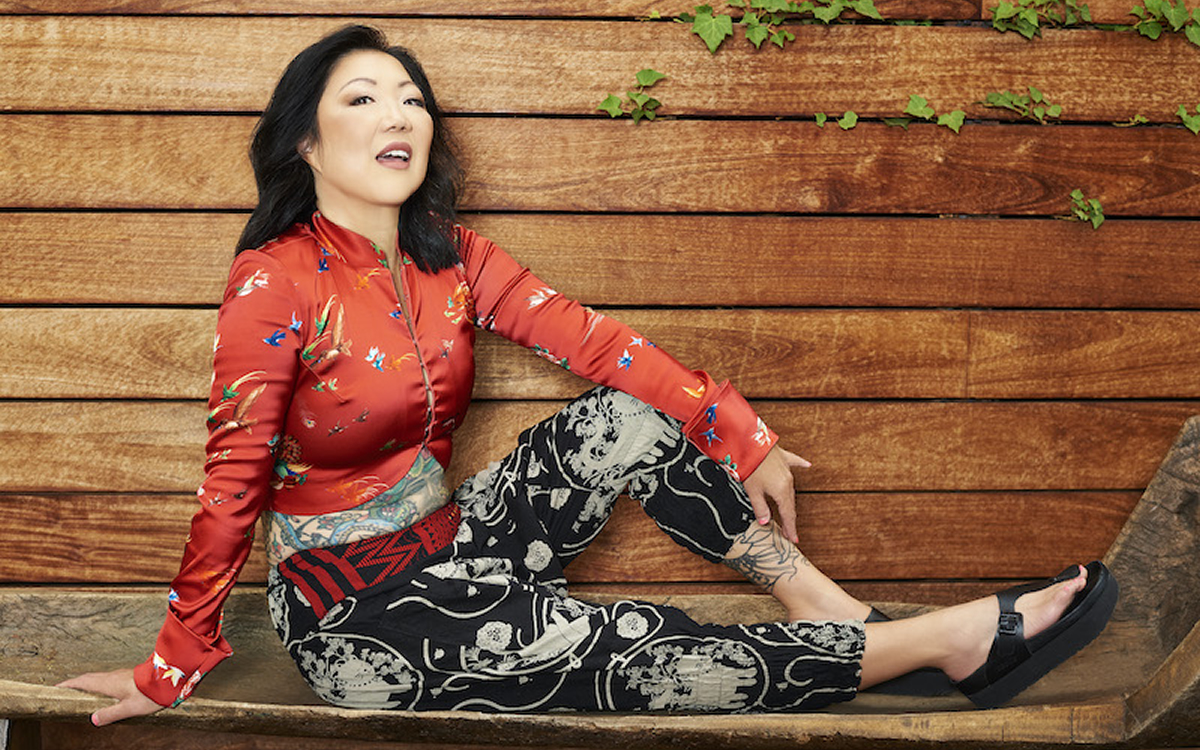
LOS ANGELES — It has been eight years since Margaret Cho released her Grammy-nominated “American Myth” album. She’s back to the music scene with her new album, “Lucky Gift,” an 11-track collection of anthems and pop tunes, a tribute to Robin Williams, and a shout-out to non-binary and gender non-conforming people.
The album captures the whirlwind that is Margaret and all of the different facets of her talents that have made her a powerhouse in entertainment and a leader in activism. In “Lucky Gift,” she’s getting her point across while having fun and getting glam.
We caught up with the activist and artist to chat about her music, our political climate, and the power of pop divas.
Known for her comedy, acting, and activism, she felt it was long overdue to get her music back out there too.
“I make music often. It’s a part of my daily life, it’s a big part of my social life, and it’s just something that I just love to do for my own relaxation and fun. I had enough for an album and I wanted to finally put them out. I was just really proud of how it all sounded together,” shares Cho.
“It’s a power pop record. For me, the songs are really meaningful. They’re all in their own way love songs. I’m a big fan of my own music (laughs), I really like the way that I sound and it’s really special to do. People know me as a comedian, and I have also made music for a long time, but it’s sort of a side project, and so it was time to put more out again.”
Her album also includes a touching tribute to Robin Williams. The entertainment community is finally more comfortable talking about mental health more openly. When relating mental health to her own life, Margaret, in true Margaret form, quickly turned the conversation to reflect today’s political climate.
“I have to maintain a level of peace and quiet and sometimes maybe get away from the news, although that’s tough because I am obsessed. I want to know what is happening. I’m really worried for our community, especially the trans community. I’m worried that this administration is trying to separate T and the Q from the LGBTQIA, and it’s really frightening.”
As an elder, Cho says she has to also remember that we’ve been through this before and it’s actually been much worse. As a community, we’ve been through a similar situation, and we were facing down a pandemic, which was killing us by the millions. So at least now we don’t have to fight AIDS as well as this onslaught of homophobia.
“We have fought for our rights, and we still have them, but we may not have them for long. So our mental health is very important to preserve now because we have to fight. The one thing to remember is they can’t do everything at once. They can’t take away trans rights, queer rights, gay rights, gay marriage, anti-depressants —ha — at the same time. So what we can do is just try to remain as calm as possible and fight as strongly as we can. But yeah, mental health is really vitally important right now.”
Margaret’s long history of queer activism stands for itself. She does not shy away from current issues, she uses her platforms to incite, educate, and question. For Margaret, there is no time off from being an activist. She was born into it, so to speak, being raised in San Francisco in the 1970s, her parents — the owners of a gay bookstore — and their employees followers of Harvey Milk.
“My activism is that I don’t have a choice. I’m going to be an activist no matter what. We’re doing this together, we’re going through this together. I will always be political. It’s just disheartening to see the ignorance of people and the lies that are being told that are believed.”
Margaret’s “Lucky Gift” comes at a perfect time when the queer community can come together over music. Cho looks at her album as a tool to empower an underdog community through the power of music.
“It’s the triumph of pop above all. We need to look to our pop divas above all. So now I’m more than ever, leaning on Madonna. [Thank God for Lady Gaga’s] “Abracadabra” because I think that things like that boost our community so much. When you can just get together and have a “brat summer,” that boosts our community so much in this togetherness, this explosion of excitement. I think Chappell Roan really ignited the pop capacity for healing. I love ‘Lucky Gift’ because it is my stepping into a pop diva moment. Pop divas should not be discounted for how important they are to our society and how much they lift us up.”
In addition to releasing her new album, Cho will continue to hit the road this year with her “Live and LIVID! Tour,” celebrating more than four decades of live stand-up shows. On this tour, she promises to rage about homophobia, sexism, racism, and the fight to stay alive. The five-time Grammy and Emmy-nominated performer is not holding back. According to her, the nation is not divided, just a little lost.
“We’re not divided. Everybody hates this. We all hate this. The fact is, the majority of the country does not want this. Unfortunately, a lot of people just didn’t vote because they just didn’t want to participate. That’s why we’re in the situation that we’re in. So to be on the road is a pleasure. And I rarely come against opposition. Every once in a while there’s something, but it’s something that we all handle. I think we all need a voice, a strong voice of reason to combat all of the hysteria.”
And her message to her fans?
“We’ll get through this. We’ll get through this with pop divas. ‘Abracadabra,’ learn the choreography, you do it sitting down. At least we have pop music, I have my hat in the ring here. But at least we have each other and we’re going to be OK. It’s going to be a ride, it’s going to be intense, but we can do this. We’ve been through this before and we are going to be fine.”
“Lucky Gift”is now available on all major streaming platforms.
-

 District of Columbia5 days ago
District of Columbia5 days agoWorldPride organizers may warn trans people from abroad not to attend event
-

 Opinions4 days ago
Opinions4 days agoIt’s time for new leadership on the Maryland LGBTQIA+ Commission
-

 The White House4 days ago
The White House4 days agoWhite House does not ‘respond’ to reporters’ requests with pronouns included
-

 Noticias en Español5 days ago
Noticias en Español5 days agoINDIGNACIÓN: ¡El transfeminicidio de Sara Millerey en Colombia nos cuestiona como sociedad!

